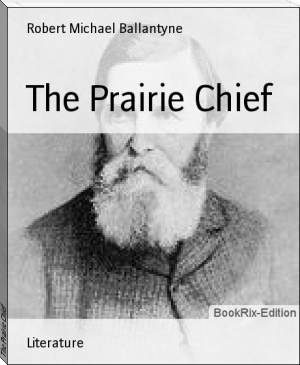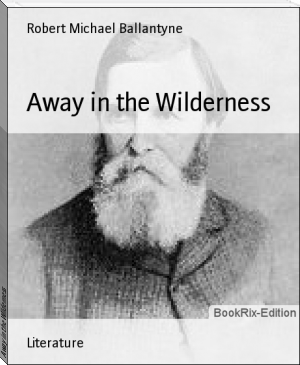The Prairie Chief - Robert Michael Ballantyne (the unexpected everything .TXT) 📗

- Author: Robert Michael Ballantyne
Book online «The Prairie Chief - Robert Michael Ballantyne (the unexpected everything .TXT) 📗». Author Robert Michael Ballantyne
We have already said, or hinted, that Rushing River was a peculiar savage. He was one of those men--perhaps not so uncommon as we think-- who hold the opinion that women are not made to be mere beasts of burden, makers of moccasins and coats, and menders of leggings, cookers of food, and, generally, the slaves of men. One consequence was that he could not bear the subdued looks and almost cringing gait of the Blackfoot belles, and had remained a bachelor up to the date of our story.
He preferred to live with his mother, who, by the way, was also an exception to the ordinary class of squaws. She was rudely intellectual and violently self-assertive, though kind-hearted withal.
That night when his mother chanced to be alone in the tent, he held some important conversation with her. Moonlight happened to be absent at a jumping-jack entertainment with Skipping Rabbit in the tent of Eaglenose, the youth himself being the performer in spite of his nose! Most of the other women in the camp were at the place where the buffalo were being cut up and dried and converted into pemmican.
"Mother," said Rushing River, who in reality had been more stunned than injured--excepting, of course, the little finger, which was indeed gone past recovery.
"My son," said Umqua, looking attentively in the chief's eyes.
"The eagle has been brought down at last. Rushing River will be the same man no more. He has been hit in his heart."
"I think not, my son," returned Umqua, looking somewhat anxious. "A piece of the bad gun struck the head of Rushing River, but his breast is sound. Perhaps he is yet stunned, and had better sleep again."
"I want not sleep, mother," replied the chief in figurative language; "it is not the bursting gun that has wounded me, but a spear of light--a moonbeam."
"Moonlight!" exclaimed Umqua, with sudden intelligence.
"Even so, mother; Rushing River has at last found a mate in Moonlight."
"My son is wise," said Umqua.
"I will carry the girl to the camp of mine enemy," continued the chief, "and deliver her to her father."
"My son is a fool," said Umqua.
"Wise, and a fool! Can that be possible, mother?" returned the chief with a slight smile.
"Yes, quite possible," said the woman promptly. "Man can be wise at one time, foolish at another--wise in one act, foolish in another. To take Moonlight to your tent is wise. I love her. She has brains. She is not like the young Blackfoot squaws, who wag their tongues without ceasing when they have nothing to say and never think--brainless ones!-- fools! Their talk is only about each other behind-backs and of feeding."
"The old one is hard upon the young ones," said the chief gravely; "not long ago I heard the name of Umqua issue from a wigwam. The voice that spoke was that of the mother of Eaglenose. Rushing River listens not to squaws' tales, but he cannot stop his ears. The words floated to him with the smoke of their fire. They were, `Umqua has been very kind to me.' I heard no more."
"The mother of Eaglenose is not such a fool as the rest of them," said Umqua, in a slightly softer tone; "but why does my son talk foolishness about going to the tents of his enemy, and giving up a girl who it is easy to see is good and wise and true, and a hard worker, and _not_ a fool?"
"Listen, mother. It is because Moonlight is all that you say, and much more, that I shall send her home. Besides, I have come to know that the pale-face who was shot by one of our braves is the preacher whose words went to my heart when I was a boy. I _must_ see him."
"But Bounding Bull and Leetil Tim will certainly kill you."
"Leetil Tim is not like the red men," returned the chief; "he does not love revenge. My enemy Bounding Bull hunts with him much, and has taken some of his spirit. I am a red man. I love revenge because my fathers loved it; but there is something within me that is not satisfied with revenge. I will go alone and unarmed. If they kill me, they shall not be able to say that Rushing River was a coward."
"My son is weak; his fall has injured him."
"Your son is strong, mother. His love for Moonlight has changed him."
"If you go you will surely die, my son."
"I fear not death, mother. I feel that within me which is stronger than death."
CHAPTER FOURTEEN.
IN WHICH PLANS, PROSPECTS, LOVE, DANGERS, AND PERPLEXITIES ARE DEALT WITH.
Three days after the conversation related in the last chapter, a party on horseback, numbering five persons, left the Blackfoot camp, and, entering one of the patches of forest with which the eastern slopes of the mountains were clothed, trotted smartly away in the direction of the rising sun.
The party consisted of Rushing River and his mother, Moonlight, Skipping Rabbit, and Eaglenose.
The latter, although still afflicted with a nose the swelled condition of which rendered it out of all proportion to his face, and interfered somewhat with his vision, was sufficiently recovered to travel, and also to indulge his bantering talk with the "skipping one," as he called his little friend. The chief was likewise restored, excepting the stump of the little finger, which was still bandaged. Umqua had been prevailed on to accompany her son, and it is only just to the poor woman to add that she believed herself to be riding to a martyr's doom. The chief however, did not think so, else he would not have asked her to accompany him.
Each of the party was mounted on a strong horse, except Skipping Rabbit, who bestrode an active pony more suited to her size. We say bestrode, because it must ever be borne in remembrance that Red India ladies ride like gentlemen--very much, no doubt, to their own comfort.
Although Rushing River had resolved to place himself unarmed in the power of his enemy, he had no intention of travelling in that helpless condition in a country where he was liable to meet with foes, not only among men but among beasts. Besides, as he carried but a small supply of provisions, he was dependent on gun and bow for food. Himself, therefore, carried the former weapon, Eaglenose the latter, and both were fully armed with hatchet, tomahawk, and scalping-knife.
The path--if such it may be called--which they followed was one which had been naturally formed by wild animals and wandering Indians taking the direction that was least encumbered with obstructions. It was only wide enough for one to pass at a time, but after the first belt of woodland had been traversed, it diverged into a more open country, and finally disappeared, the trees and shrubs admitting of free passage in all directions.
While in the narrow track the chief had headed the little band. Then came Moonlight, followed by Umqua and by Skipping Rabbit on her pony, Eaglenose bringing up the rear.
On emerging, however, into the open ground, Rushing River drew rein until Moonlight came up alongside of him. Eaglenose, who was quick to profit by example--especially when he liked it--rode up alongside of the skipping one, who welcomed him with a decidedly pale-face smile, which showed that she had two rows of bright little teeth behind her laughing lips.
"Is Moonlight glad," said the chief to the girl, after riding beside her for some time in silence, "is Moonlight glad to return to the camp of Bounding Bull?"
"Yes, I am glad," replied the girl, choosing rather to answer in the matter-of-fact manner of the pale-faces than in the somewhat imaginative style of the Indians. She could adopt either, according to inclination.
There was a long pause, during which no sound was heard save the regular patter of the hoofs on the lawn-like turf as they swept easily out and in among the trees, over the undulations, and down into the hollows, or across the level plains.
"Why is Moonlight glad?" asked the chief.
"Because father and mother are there, and I love them both."
Again there was silence, for Moonlight had replied some what brusquely. The truth is that, although rejoicing in the prospect of again seeing her father and mother, the poor girl had a lurking suspicion that a return to them meant final separation from Rushing River, and--although she was too proud to admit, even to herself, that such a thought affected her in any way--she felt very unhappy in the midst of her rejoicing, and knew not what to make of it. This condition of mind, as the reader knows, is apt to make any one lower than an angel somewhat testy!
On coming to a rising ground, up which they had to advance at a walking pace, the chief once more broke silence in a low, soft voice--
"Is not Moonlight sorry to quit the Blackfoot camp?"
The girl was taken by surprise, for she had never before heard an Indian--much less a chief--address a squaw in such a tone, or condescend to such a question. A feeling of self-reproach induced her to reply with some warmth--
"Yes, Rushing River, Moonlight is sorry to quit the lodges of her Blackfoot friends. The snow on the mountain-tops is warmed by the sunshine until it melts and flows down to the flowering plains. The heart of Moonlight was cold and hard when it entered the Blackfoot camp, but the sunshine of kindness has melted it, and now that it flows towards the grassy plains of home, Moonlight thinks with tenderness of the past, and will _never_ forget."
Rushing River said no more. Perhaps he thought the reply, coupled with the look and tone, was sufficiently satisfactory. At all events, he continued thereafter to ride in profound silence, and, checking his steed almost imperceptibly, allowed his mother to range up on the other side of him.
Meanwhile Eaglenose and Skipping Rabbit, being influenced by no considerations of delicacy or anything else, kept up a lively conversation in rear. For Eaglenose, like his chief, had freed himself from some of the trammels of savage etiquette.
It would take up too much valuable space to record all the nonsense that these two talked to each other, but a few passages are worthy of notice.
"Skipping one," said the youth, after a brief pause, "what are your thoughts doing?"
"Swelled-nosed one," replied the child, with a laugh at her own inventive genius, "I was thinking what a big hole you must have made in the ground when you got that fall."
"It was not shallow," returned the youth, with assumed gravity. "It was big enough to have buried a rabbit in, even a skipping one."
"Would there have been room





Comments (0)